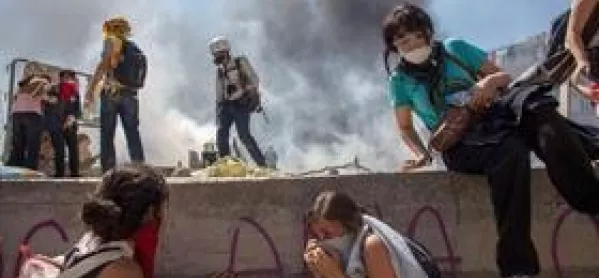Teachers risk all to join Turkey demonstrations

Pictures of demonstrators in Turkey fleeing tear gas have shocked the world over the past two weeks. The violent clashes between protesters and riot police are evidence of many people’s unhappiness at what they call the “authoritarian policies” of Prime Minister Recep Tayyip Erdogan.
School teachers have described how they felt compelled to join the protests, despite the risk of arrest and serious injury, while many more colleagues took part in two days of strike action in support of the demonstrators. One teacher of five- and six-year-olds told TES how her eyes burned and she struggled to breathe after being sprayed with tear gas.
These events have cast a spotlight on other accusations against the Turkish government. Teaching unions allege that it is making ongoing attempts to suppress them by accusing activists of terrorism offences. Unions claim that 99 members are currently being detained by the authorities, although this number fluctuates.
Mehmet Bozgeyik, general secretary of the teaching union Egitim-Sen, and Sakine Esen Yilmaz, its women’s secretary, were arrested in June last year and detained for 10 months on terrorism charges. Thirteen other members suffered the same fate after raids on homes and offices.
Although they were released in April under strict conditions, the charges have not been dropped and the activists could face 15 years’ imprisonment if they are found guilty at trial. In February this year, further raids took place in 28 cities across Turkey, during which 100 union activists, including many from Egitim-Sen, were arrested for alleged links to terrorist organisations.
A report commissioned by Education International, a global federation of teaching unions, and carried out by academics at the universities of Bristol and Amsterdam in 2010, says that labelling trade unionists as terrorists and criminals has “long been a strategy of the Turkish state”.
“While trade unionism has now been legalised (since 2001), the right to collective bargaining, negotiation and the right to strike remain highly restricted,” it says.
The unions have been at the heart of opposition to recent reforms and proposed cuts that would potentially reduce teachers’ job security and lower their wages.
Fred van Leeuwen, general secretary of Education International, told TES this week: “Unions are still being thwarted in their organising efforts by dubious court cases and arrests of their leaders. While the first link between Turkey’s trade unions and any real or perceived terrorist organisation has yet to be found, the authorities leave no opportunity untapped to refer to such an alleged link as an excuse for harsh and arbitrary repression.”
Abdullah Muhsin, international officer at the NASUWT teaching union in the UK, was part of an international delegation that attended the court hearings of the accused union leaders. “These are teachers and their key issues are job security, wages and working conditions,” he said. “They want to be part of a free society as well but freedom of speech has been curtailed.”
One teacher in Istanbul, who did not want to be named, told TES that she joined demonstrations after seeing pictures of police spraying tear gas at protesters opposed to the redevelopment of the city’s Gezi Park. She described herself as an “apolitical” teacher who had felt compelled to protest.
“I was unhappy with AKP’s (the ruling party’s) policies and repressive decisions but always hopeful that they wouldn’t be elected,” she said via email. “I saw policemen in front of the crowd wearing gas masks, looking like RoboCop. They started walking towards us, discharging the tear gas. The riot vehicle was coming towards us, targeting people with gassed water. We were running back, screaming but still chanting for the resignation of the government. My eyes were burning terribly and I could hardly breathe.”
Back at work, she said that the children were also talking about the protests. “Some were talking about police, tear gas and water cannon,” she said. “I was surprised to hear such things from my little ones.”
Waiting for the knock at the door
The situation of the imprisoned Turkish unionists has echoes of the case of Jalila al-Salman, a leading member of a Bahraini teaching union who was imprisoned for supporting a call for a strike during the Arab Spring uprisings in 2011.
As previously reported in TES, security officers took her away from her husband and three children without explanation. The well-respected assistant principal said she was blindfolded, tortured and threatened with sexual assault.
A two-year ordeal followed during which she was arrested and jailed three times and spent six months in prison. Al-Salman is now free but has lost her job and lives in constant fear of the knock at the door. She is now an international campaigner.
Photo: Demonstrators flee tear gas in Turkey. Photo credit: Getty
Keep reading for just £1 per month
You've reached your limit of free articles this month. Subscribe for £1 per month for three months and get:
- Unlimited access to all Tes magazine content
- Exclusive subscriber-only stories
- Award-winning email newsletters



